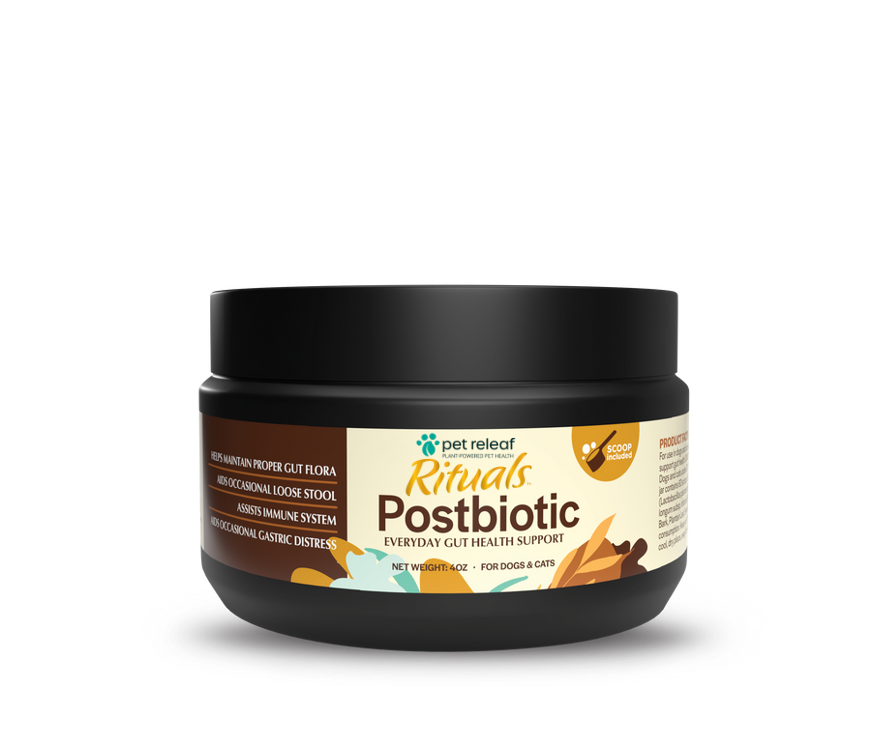
As a pet parent, making sure your furry family member’s gut health is very important for their overall wellbeing. Digestive health influences everything from nutrient absorption and immune function to mood and energy levels. Prebiotics, probiotics, and Postbiotics play unique roles in maintaining this balance, but recent advances have spotlighted Postbiotics as a potentially more effective and less disruptive option for sensitive stomachs.
Understanding Prebiotics and Probiotics
Before diving into the innovative world of Postbiotics, let’s break down the roles of prebiotics and probiotics.
Prebiotics are essentially food for probiotics. These non-digestible fibers help nourish and stimulate the growth of beneficial bacteria in the gut. Common prebiotic sources include inulin, fructooligosaccharides (FOS), and certain types of fiber found in foods like pumpkin, apples, and bananas. While prebiotics are generally safe, they require a careful balance to avoid overfeeding harmful bacteria.
Probiotics are live bacteria that add to the population of good bacteria in your pet’s digestive tract. These are found in fermented products like yogurt, kefir, and specialized pet supplements. Probiotics can help restore the natural balance of gut flora, which can be disrupted by factors such as antibiotics, poor diet, or stress. However, introducing foreign bacteria into your pet’s system can sometimes lead to unwanted effects such as gas and bloating, particularly in pets with sensitive stomachs.
The Rise of Postbiotics
Postbiotics are a newer and increasingly favored technology in pet health. They are byproducts produced from the fermentation process of probiotics, including various beneficial substances like enzymes, peptides, and acids. These components offer the advantages of probiotics but without the drawbacks of introducing live bacteria into your pet’s gut.
The Bee Analogy for Understanding Prebiotics, Probiotics, and Postbiotics
To better understand the roles of prebiotics, probiotics, and Postbiotics, we can explore how bees interact with their environment.
- Pollen as Prebiotics: Prebiotics are like the pollen that bees collect. They serve as nourishment for probiotics, helping these good bacteria flourish in your pet’s digestive system.
- Bees as Probiotics: Just as bees pollinate plants, enabling growth and flower production, probiotics are beneficial bacteria that promote a healthy balance in your pet’s gut, aiding digestion and immune health.
- Honey as Postbiotics: After bees process pollen, they produce honey. Similarly, Postbiotics are beneficial byproducts created when probiotics ferment prebiotics. These compounds support gut health and well-being, much like honey supports a bee’s hive.
Here’s why Postbiotics are gaining traction amongst pet health experts:
- Gentle on Sensitive Stomachs: Unlike probiotics, Postbiotics do not involve introducing potentially disruptive live bacteria, which means they are much gentler on pets’ digestive systems.
- Maintains Proper Gut Flora: Postbiotics help maintain a balanced gut environment by supporting the growth of beneficial bacteria and suppressing harmful ones. This is important for your pet’s overall health and immunity.
- Aids in Managing Loose Stools: By enhancing gut health, Postbiotics can help manage occasional loose stools, preventing the discomfort and potential health risks associated with diarrhea.
- Supports the Immune System: A healthy gut contributes to a strong immune system. Postbiotics support this connection by promoting an environment that allows the immune system to function effectively.
- Assists with Occasional Gastric Distress: For pets experiencing mild gastric distress, Postbiotics provide a soothing effect by improving the overall health of the digestive tract.
Choosing the Right Supplement
When picking the best gut health supplement for your pet’s digestion, consider the following:
- Consult Your Veterinarian: Always discuss any new supplements with your vet, especially if your pet has health concerns.
- Quality and Source: Look for supplements that are specifically formulated for pets and are made from high-quality, safe ingredients.
- Ease of Use: Choose supplements that are easy to administer. Postbiotics are often available in forms that are plateable and can be easily mixed into your pet’s food.
While prebiotics and probiotics have their place in veterinary health, the innovative nature of Postbiotics offers a promising alternative, especially for pets with sensitive digestive systems. By carefully selecting the proper foods and supplements for your pet, you can naturally and proactively enhance your pet’s digestive health and overall well-being.


